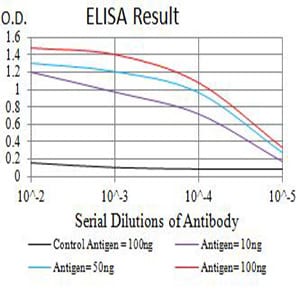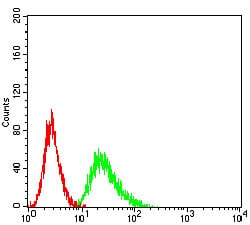

| WB | 咨询技术 | Human,Mouse,Rat |
| IF | 咨询技术 | Human,Mouse,Rat |
| IHC | 咨询技术 | Human,Mouse,Rat |
| ICC | 技术咨询 | Human,Mouse,Rat |
| FCM | 1/200 - 1/400 | Human,Mouse,Rat |
| Elisa | 1/10000 | Human,Mouse,Rat |
| Aliases | CCR1; CKR1; CKR-1; HM145; CMKBR1; MIP1aR; SCYAR1 |
| Entrez GeneID | 1230 |
| clone | 8E10G6 |
| WB Predicted band size | 41.2kDa |
| Host/Isotype | Mouse IgG1 |
| Antibody Type | Primary antibody |
| Storage | Store at 4°C short term. Aliquot and store at -20°C long term. Avoid freeze/thaw cycles. |
| Species Reactivity | Human |
| Immunogen | Purified recombinant fragment of human CD191 (AA: extra mix) expressed in E. Coli. |
| Formulation | Purified antibody in PBS with 0.05% sodium azide |
+ +
以下是关于CD191(CCR5)抗体的3篇代表性文献摘要:
---
1. **文献名称**:*Targeting CCR5 in HIV infection: Current status and future directions*
**作者**:Moore JP, Kitchen SG
**摘要**:探讨CCR5(CD191)作为HIV感染关键共受体的作用,总结抗CCR5单克隆抗体(如Maraviroc类似物)通过阻断病毒进入宿主细胞的治疗策略,并分析其在临床试验中的效果与耐药性问题。
2. **文献名称**:*CCR5 blockade for tumor immunotherapy: A systematic review*
**作者**:Peng SB, Li Y
**摘要**:综述CCR5抗体在肿瘤微环境中的调节作用,包括抑制Treg细胞迁移、增强抗肿瘤免疫应答的机制,以及在乳腺癌和结直肠癌模型中的临床前研究进展。
3. **文献名称**:*Anti-CCR5 antibody ameliorates autoimmune arthritis via modulating T cell differentiation*
**作者**:Suzuki K, Yamamoto K
**摘要**:通过实验证明抗CCR5抗体可减少Th17细胞向关节组织浸润,缓解类风湿性关节炎小鼠模型的炎症反应,提示其作为自身免疫疾病治疗靶点的潜力。
---
这些文献覆盖了CCR5抗体在病毒感染、肿瘤免疫及自身免疫病中的关键研究方向。如需具体文章检索,建议通过PubMed或Web of Science平台输入“CCR5 antibody”及相关关键词进一步筛选。
CD191. also known as CCR5 (C-C chemokine receptor type 5), is a G protein-coupled receptor expressed on immune cells, including T lymphocytes, macrophages, and dendritic cells. It plays a critical role in mediating chemotaxis and immune responses by binding to specific chemokines such as CCL3. CCL4. and CCL5. CD191/CCR5 gained significant attention due to its role as a co-receptor for HIV-1 entry into host cells. Certain HIV-1 strains utilize CCR5 alongside CD4 to infect target cells, making it a key therapeutic target. The discovery of the CCR5Δ32 mutation, which confers natural resistance to HIV-1 infection in homozygous individuals, further highlighted its biological importance.
CD191 antibodies are tools used to study CCR5 expression, function, and signaling in immune regulation, inflammation, and viral pathogenesis. They enable researchers to block or detect CCR5 in experimental models, aiding in understanding its involvement in diseases like HIV/AIDS, autoimmune disorders, and cancers. Therapeutic anti-CCR5 antibodies, such as those explored in HIV treatment, aim to inhibit viral entry or modulate immune responses. Additionally, CCR5 antagonists like maraviroc, a small-molecule drug, have been developed based on insights from antibody studies. Beyond HIV, CD191 antibodies are investigated in contexts like cancer immunotherapy, where CCR5 blockade may reduce metastasis or enhance anti-tumor immunity. However, CCR5's dual roles in immune defense and pathology necessitate careful targeting to avoid unintended immunosuppression. Overall, CD191 antibodies remain vital for both basic research and the development of therapies targeting CCR5-mediated pathways.
×